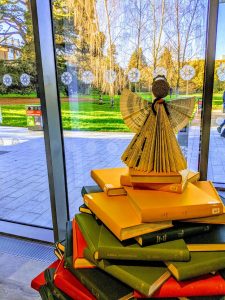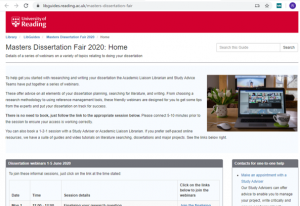So, you may have just finished your exams but now you have to turn your attention to your dissertation. Where do you begin and how can you ensure you stay on track? Below are our Study Advice and Library tips to help you get started and stay focused.

Tip #1: Have a plan
Having a plan not only helps you to stay on track but weekly goals keep you motivated. Work backwards from your hand in date and remember to build in extra time for proofreading and final touches. Our videos on managing your time offer some tips to get you started.
Tip #2: Start with something small
To help you get going, start with a task that you can get done easily. This might be something simple, like setting up a word template or printing off a couple of key articles. Being able to complete one task can give you a sense of achievement and motivate you to tackle more challenging ones.
Tip #3: Think about the information that you need…
…and how to access it! If you are carrying out a literature review, or analysing documents or literature, make sure that you are familiar with the key online resources in your subject area. You can find out more about what’s available to you, as well as contact details for your Academic Liaison Librarian, on your Library subject guide. Look at the COVID-19 page in the guide for top tips on how to access resources when off-campus.
Tip #4: Think more, read less
It’s important that you think critically about what you’re reading. This requires you to see the links between various theories and consider what they mean for your research question. So, when taking notes remember to not only record a summary of your reading but more importantly note what you think about what you have read. This will help you when you come to write up. Our video on critical note-taking offers some advice on this.
Tip #5: Attend a webinar
The Library and Study Advice teams are running a series of webinars for Masters students working on their dissertations. The Masters Dissertation Fayre is back for a second year, covering a range of topics from selecting a reference management tool, to structuring your literature review.
Webinars will run online at 11am and 2pm each day from Monday 7th – Friday 11th June. These friendly and helpful sessions are open to all Masters students, and you can book a place online.
Thanks for reading,






 It’s February which means if you’re a final year student, you’re probably frantically trying to complete your dissertation. Over the past few weeks, the
It’s February which means if you’re a final year student, you’re probably frantically trying to complete your dissertation. Over the past few weeks, the  If you find that your eyes feel tired, you feel headachy, struggle to concentrate or have neck and back pain, one possible explanation could be screen fatigue, say our
If you find that your eyes feel tired, you feel headachy, struggle to concentrate or have neck and back pain, one possible explanation could be screen fatigue, say our  Covid-19 has brought with it new ways of working and learning for all of us. A term in, it’s time to reflect on what has worked and what new strategies we need to try to keep on top of our studies. Our
Covid-19 has brought with it new ways of working and learning for all of us. A term in, it’s time to reflect on what has worked and what new strategies we need to try to keep on top of our studies. Our 


 You may have got used to studying at home in the last few weeks, but then younger family members had homework to do too. Now that it’s the Easter holidays, how can you maintain the same momentum with your studies when you have children or younger siblings to occupy? It’s going to be more challenging, but here are some tips from your Study Advisers – who are also like you, trying to work and study at home with families.
You may have got used to studying at home in the last few weeks, but then younger family members had homework to do too. Now that it’s the Easter holidays, how can you maintain the same momentum with your studies when you have children or younger siblings to occupy? It’s going to be more challenging, but here are some tips from your Study Advisers – who are also like you, trying to work and study at home with families. Tip # 6 Ringfence study periods – this could be when children are occupied by a partner or siblings
Tip # 6 Ringfence study periods – this could be when children are occupied by a partner or siblings Preparing for take home exams? Follow our top 5 study tips.
Preparing for take home exams? Follow our top 5 study tips. Studying at home requires self-discipline, organisation and effective time management strategies. Follow our Study Advice top 5 tips to make the most of your study time at home.
Studying at home requires self-discipline, organisation and effective time management strategies. Follow our Study Advice top 5 tips to make the most of your study time at home.